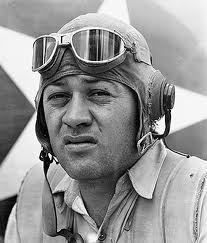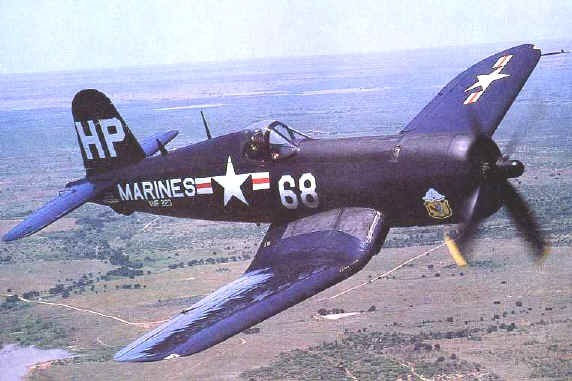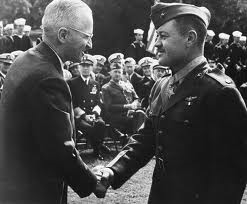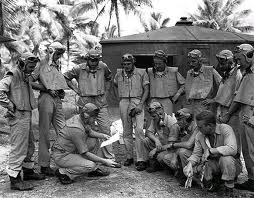 |
| Gregory Boyington |
A Hero Among Us
At midnight, a drunken man stumbles down the street towards his house. He is so intoxicated that he has no idea of his surroundings. People look disgusted as they watch him pass. But little did they know that the man they frowned upon was Gregory “Pappy” Boyington. He would go on to work for Boeing and become a Marine pilot, be part of the Flying Tigers, lead his own fighter squadron in the AVG in tour, become a POW, and earn the Congressional Medal of Honor and the Navy Cross. Boyington did not just sign up for the military, do his time, and go home. He went above and beyond expectations and acted with courage, selflessness, a strong care for others, and a great sense of humbleness.
 |
| A Corsair, the type of aircraft 'Pappy' Boyington |
Leaving the safety of his home in the United States to join the military and fight for our country’s freedom. Boyington exhibited heroic traits of selfless acts and care for others as he “struck at the enemy with daring and courageous persistence, leading his squadron into combat with devastating results to Japanese shipping, shore installations, and aerial forces. Resolute in his efforts to inflict crippling damage on the enemy, Major Boyington led a formation of 24 fighters over Kahili on 17 October and, persistently circling the airdrome where 60 hostile aircraft were grounded, boldly challenged the Japanese to send up planes.”(Michael Robert Patterson). Although he knew that he was risking his life, Boyington believed that the loss of his life would be less damaging than the loss of many younger men, so he fought to protect those young men.
Unfortunately, it was his selflessness earned him a spot in a Japanese held POW camp, as “the day of Boyington's 26th kill was also the day which he was shot down. Rescued by a Japanese submarine, Boyington spent the next 20 months in prisoner of war camps.”(Michael Robert Patterson). Boyington sacrificed his safety that day to protect a younger member of his squadron. This act proves that Boyington had a sense of responsibility to his men, and would risk anything to protect them. Despite the rough series of events, Boyington lead the men at the POW camp and provided morale, even when he was tortured and famished. These acts show Boyington’s heart and concern for others, and how it affected numerous lives, whether they were back in the United States or on the battlefield.
 |
| Gregory 'Pappy' Boyington receiving the Medal of |
Boyington was both courageous and humble. Many thought that he would not amount to anything, and would go on through his life without many accomplishments. But, Boyington joined the military and these traits shined through his rough appearance. His acts of courage strengthened the will and morale of the men surrounding him. In turn, they fought harder than ever and as a result, many of them would come back to their homes and families. This is a brief example of his traits, “For extraordinary heroism and valiant devotion to duty as commanding officer of Marine Fighting Squadron 214 in action against enemy Japanese forces in the Central Solomons area from 12 September 1943 to 3 January 1944. Consistently outnumbered throughout successive hazardous flights over heavily defended hostile territory, Maj. Boyington struck at the enemy with daring and courageous persistence, leading his squadron into combat with devastating results to Japanese shipping, shore installations, and aerial forces.” Boyington was courageous in the act of leading his men against the odds and coming out strong. He paved the way through the skies for his men and those to follow. Never would he think of himself as a courageous being, but just someone who was doing what they were supposed to do. Boyington, a very war-hardened and respected man, was also a very humble being from a small town in Idaho. As stated here, ”Col. Gregory “Pappy” Boyington was one of the most decorated and prestigious fighter pilots in the world during WWII. Boyington, born and raised in Coeur D'Alene, Idaho, was awarded the Medal of Honor and the Navy Cross for his actions in the Solomon Islands from Sept. 12, 1943, through Jan. 3, 1944, as commanding officer of, Marine Fighting Squadron 214.”(Lance Cpl. Bryan G. Carfrey). Being the humble man that he was Boyington chose to settle down with his family away from the spotlight and the media. Pappy preferred to spend precious time with loved ones and to guide others who sought his advice. Refusing to think of himself as a national hero, shying away from the spotlight after leading a group of airmen into countless battles with the Japanese, and surviving the rest of the war after becoming a POW, Boyington shows that he is courageous yet humble.
 |
| Boyington briefing his squadron before a mission. |
Pappy Boyington was not the average man. He acted for others with extreme acts of courage, a selfless state-of-mind, a strong care for others, and a sense of humility. He served his country throughout WWII, constantly gaining an edge on the enemy. He led a group of men to numerous victories and became an American Ace with a record of 26 confirmed kills. And he aided fellow POWs when he was captured by the Japanese, allowing them to have increased morale and health which ultimately led them to surviving the camp and to liberation. Pappy can be seen as a strong willed role model to anyone that knows and really learns his values. And if more people started to take his values and ideals to heart, the community that we all reside in would benefit and become an overall better place.
Page created on 1/20/2011 12:00:00 AM
Last edited 1/20/2011 12:00:00 AM
Carfrey, Bryan G. "Pappy Boyington Field." Marines. N.p., n.d. Web. 17 Dec. 2010. (http://www.marines.mil)
"Pappy Boyington." Gale Student Resources in Context. N.p., 1988. Web. 14 Dec. 2010.
Patterson, Michael Robert. "Gregory H. Pappy Boyington." Arlington Cemetery. N.p., n.d. Web. 14 Dec. 2010. (http://arlingtoncemetery.net/ ghboying.htm)
Shettle, M L, Jr. "Colonel Gregory R. 'Pappy' Boyington." Military Museum. N.p., n.d. Web. 14 Dec. 2010. (http://militarymuseum.org/Boyington.html)
